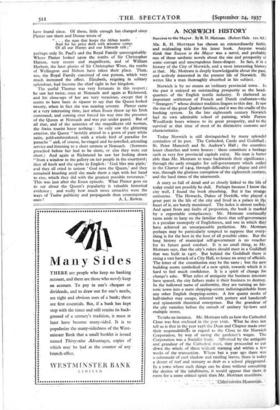A NORWICH HISTORY
Success to the Mayor. By R. H. Mottram. (Robert Hale. I2S. 6d.)
MR. R. H. Morrastm has chosen an extraordinarily feeble and misleading title for his latest book. Anyone would think that Success to the Mayor was a novel, and probably one of those sardonic novels about the rise and prosperity of some corrupt and unscrupulous linen-draper. In fact, it-is a history of the City of Norwich, and a most interesting history at that. Mr. Mottram is deeply knowledgeable about the past, and actively interested in the present life of Norwich. He writes like a man thoroughly absorbed in his subject.
Norwich is by no means an "ordinary provincial town. In the past it enjoyed an outstanding prosperity as the head, quarters of the English textile industry. It sheltered an important settlement of French and Dutch craftsmen--the " Strangers " whose distinct tradition lingers to this day. It saw the rise of the great Quaker families, and it was the cradle of the banking system. In the late eighteenth century Norwich had its own admirable school of painting, while Parson Woodforde bears witness to its great prosperity, and to the survival at that time of most of its distinctive customs and characteristics.
Today Norwich is still distinguished by many splendid reminders of its past. The Cathedral, Castle and Guildhall ; St. Peter Mancroft and St. Andrew's Hall ; the countless lesser churches and town houses : 'these constitute a heritage such as very few provincial capitals enjoy. No man is better able than Mr. Mottram to trace backwards their significance ; through the early struggles for self-government which ended in the Charter of 1404, through difficulties of plague and civil war, through the glorious corruption of the eighteenth cenniry, and the hard times of the nineteenth.
A story so full of detail and _so closely linked to the life of today could not possibly be dull. Perhaps because I know the city well, I found the book absorbing. But it has strange omissions. The Howards, Dukes of Norfolk, who played: great part in the life of the city and lived in a palace in le heart of it, are barely mentioned. The index is almost useless; And apart from any faults of proportion, the book is markid by a regrettable complacency. Mr. Mottram continually turns aside to harp on the familiar thesis that self-goverrunent is a peculiar monopoly of Englishmen, and one in which they have achieved an unsurpassable perfection. Mr. Mottram perhaps may be particularly tempted to suppose that every- thing is for the best in the best of all possible cities. But the long history of municipal self-government is no voucher for its future good conduct. It is no small thing, as Mr. Mottram says, that the city's rulers should meet in a Guildhall that was built in 1407. But behind the Guildhall there is rising a vast barrack of a City Hall, to house an army of officials. The letter of the constitution may be the same ; but the new building seems symbolical of a new spirit, towards which it is hard to feel much confidence. It is a spirit of change for change's sake. What relics of antiquity the business interests have spared, the city fathers make it their business to destroy. In the hallowed name of uniformity, they are turning an his- toric town into a mere shopping-centre indistinguishable from any other English shopping-centre. A few quaint nooks of half-timber may escape, infested with pottery and handicraft and spinsterish theatrical enterprises. But the grandeur . of the city vanishes before the onrush of sanitary by-laws and multiple stores.
To take an instance. Mr. Mottram tells us how the Cathedral Close was first enclosed in the year 1 too. What he does not tell us is that in the year 1936 the Dean and Chapter made over their responsibilitaes in regard to the Close_ to the Norwich" Corporation, by way of saving the gardener's wages. The Corporation was a Socialist body. Affronted by the antiquity and grandeur of the Cathedral trees, they proceeded to cut down the whole of them without warning and within a few weeks of the transaction. Where but a year ago there was a colonnade of cool shadow and rustling leaves, there is today a desert of turf and statuary as drab as a school playground. In a town where such things can be done without consulting the desires of the inhabitants, it would appear that there is room for a more critical spirit than Mr. Mottram manifests.
-CjiaiTOPlitR goatiousE. • . _


















































 Previous page
Previous page